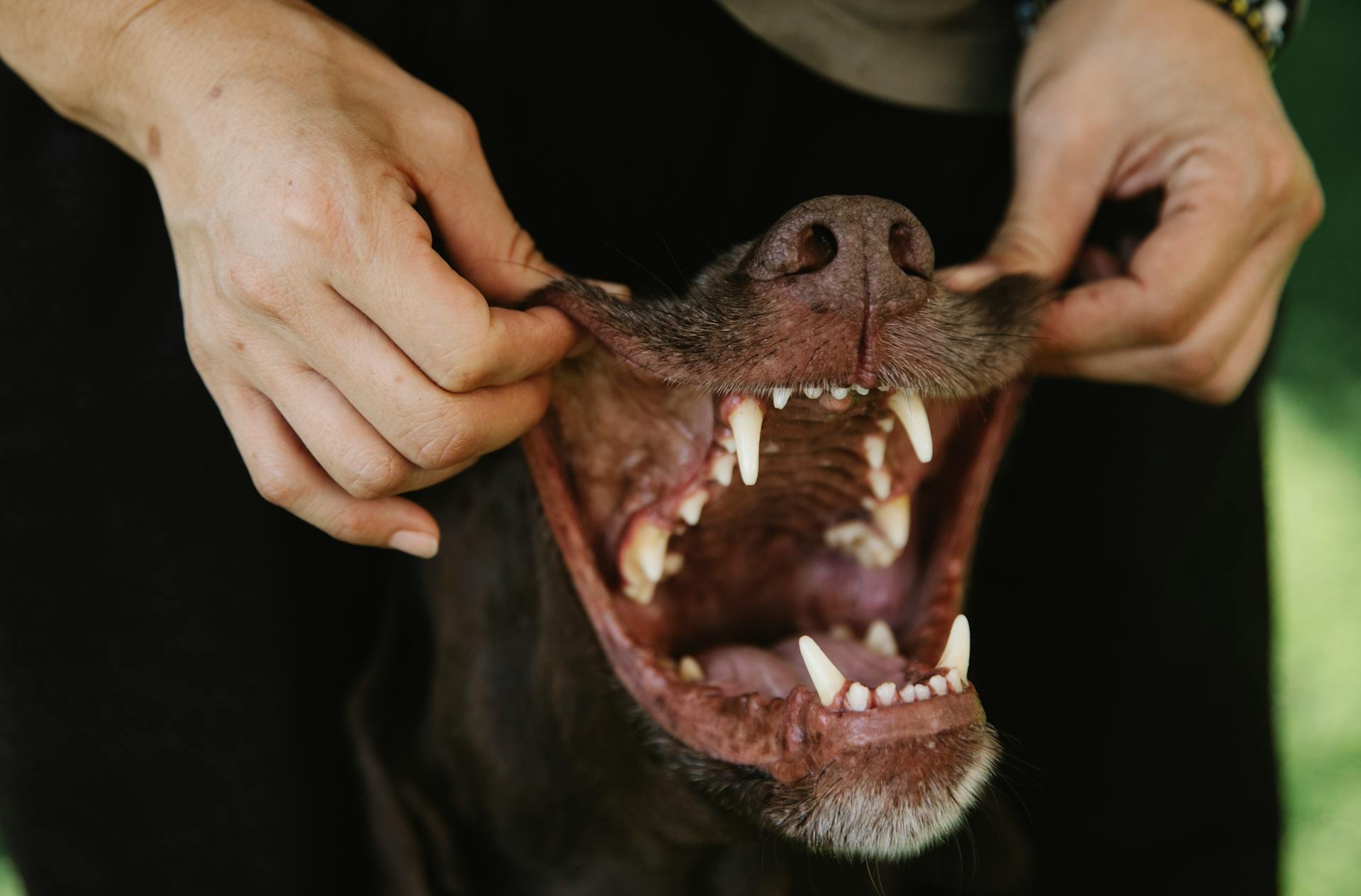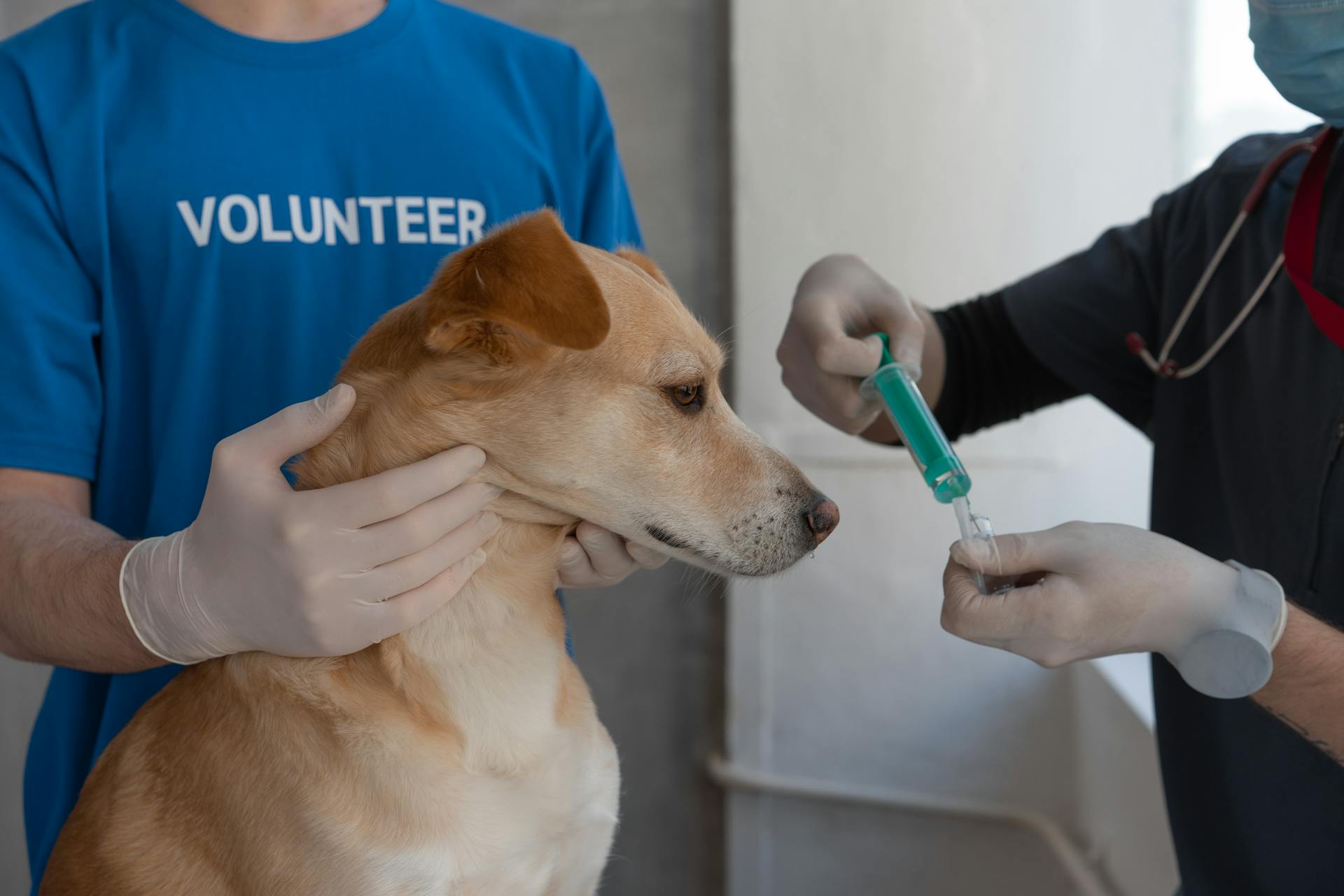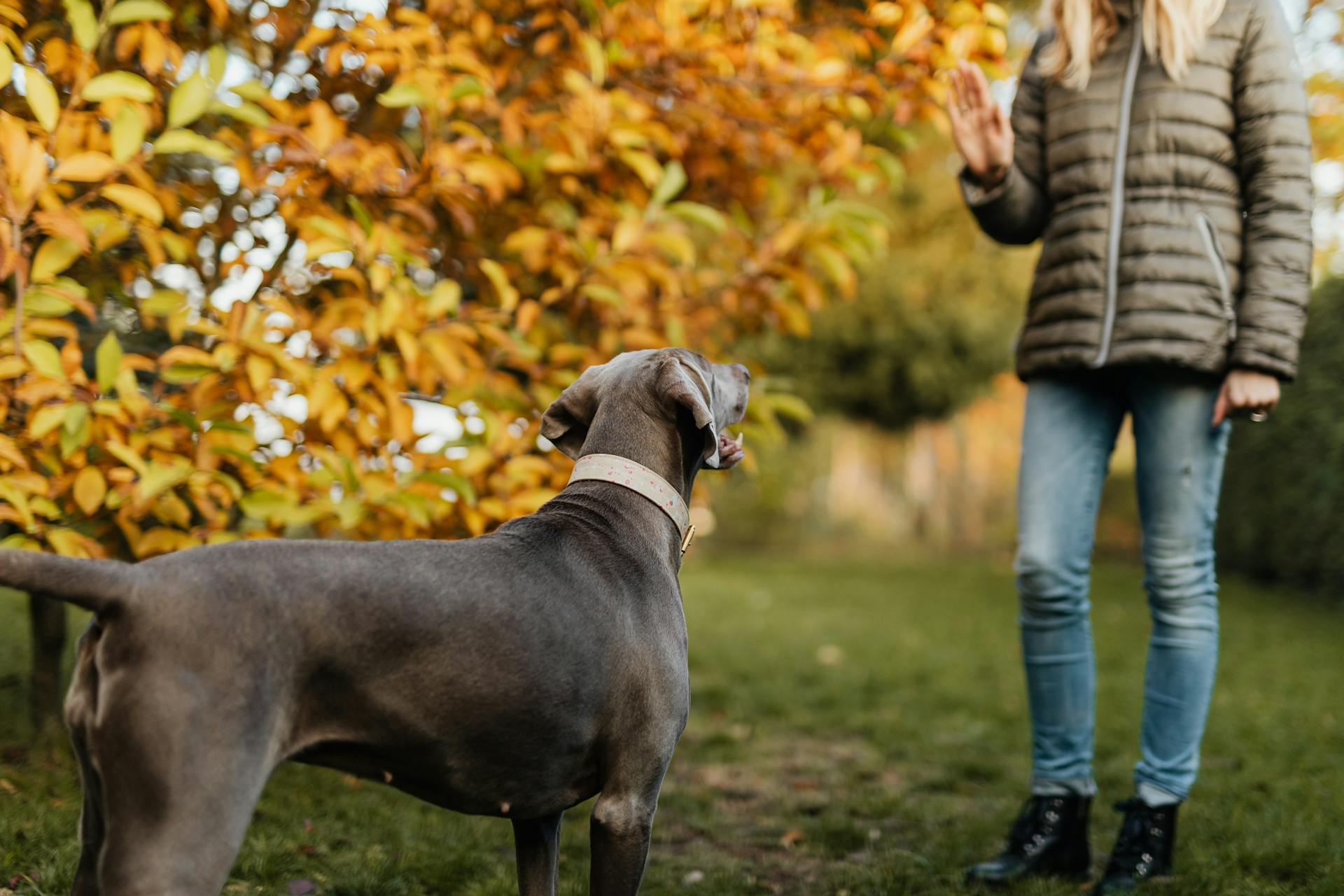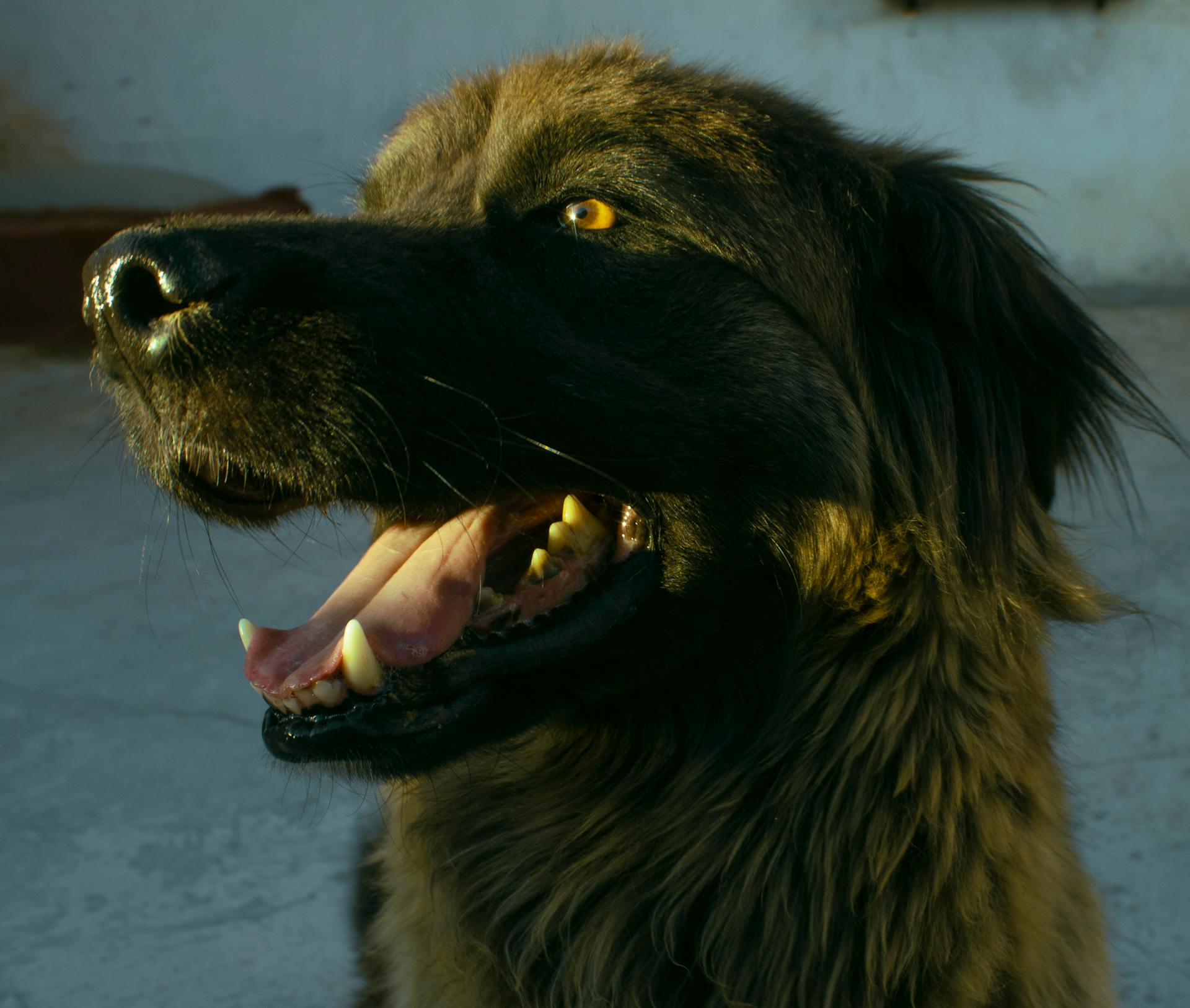
Welcoming a new Boerboel puppy into your family is a thrilling experience, but it also comes with a lot of responsibility. Boerboel puppies require a lot of attention and care in the first few months of their life.
They need a nutritious diet, and their parents are typically fed a high-quality commercial dog food. Feeding your Boerboel puppy a balanced diet is crucial for their growth and development.
Boerboel puppies are prone to overeating, so it's essential to monitor their food intake and ensure they don't overindulge.
Recommended read: All Black Boerboel
Boerboel Basics
The Boerboel is a short-haired pup, but they're not entirely low maintenance.
They require a lot of time spent in training and exercising, so be prepared to build a deep bond with your pup.
Their grooming needs are minimal, but the time and effort you put into training and exercising them will be well worth it.
Size
Boerboels are large dogs, with males averaging 24 to 28 inches in height at the shoulder.
Their height can vary slightly, with females tending to be between 22 and 25 inches in height.
Boerboels usually weigh between 110 and 200 pounds, which is a significant range that can vary depending on the individual dog.
Some Boerboels can be larger or smaller than this range, but this gives you a general idea of what to expect.
Appearance
The Boerboel's appearance is a key part of what makes them such an intimidating guard dog. They have a broad head and jowly faces, typically with a black mask.
Their ears are medium-sized and V-shaped, folding over and laying flat. This unique ear shape is a distinctive feature of the breed.
Their eyes are dark brown and have an intelligent expression, giving them a sharp and alert look. It's not uncommon to see a Boerboel with a piercing stare.
Their broad muzzle and solid black nose give them a rugged and powerful appearance. The Boerboel's short coats are smooth, dense, and shiny, requiring minimal grooming.
Boerboel coats come in a range of colors, including red, brown, reddish-brown, fawn, and cream, often with black coloring in the shape of a mask on their face. They can also be brindled (subtle tiger stripes) or Irish marked (white on the legs, face, and collar).
Their tail is straight, and the breed standard allows for it to be docked or undocked. However, many veterinarians and organizations have spoken out against docking due to medical and behavioral concerns.
For your interest: Brown Chiweenie Puppy
Personality and Temperament
Boerboel puppies are natural-born protectors, bred to be fiercely loyal to their loved ones. They'll put themselves in harm's way to keep you safe.
Boerboels are playful and intelligent, but they can be overprotective at times, making them wary of strangers. This means you'll need to introduce new guests to them properly to avoid any tension.
These dogs thrive on having a job to do, whether it's farm work, guard duty, or competing in agility and strength competitions. They love human family members, including children, but require proper training and socialization to prevent aggression.
Boerboels are dominant dogs that require an assertive trainer who uses positive reinforcement and sets boundaries without being harsh. They're not suited for first-time owners, but with patient, consistent training, they can become loyal companions.
Boerboels need plenty of mental and physical stimulation to prevent boredom and anxiety, which can lead to destructive behavior. Long walks, vigorous play sessions, and challenging activities like puzzle feeders can help keep them happy and healthy.
In an ideal world, Boerboels would have a big backyard with a high, durable fence to give them space to run around safely. They're not suited for apartment living due to their size and exercise needs.
Boerboels are gentle at home, but their size and strength can be intimidating, especially to smaller children. They're best suited for families with older children who understand how to interact with them safely.
With proper socialization and training, Boerboels can get along with other pets, including cats and dogs, but it's essential to introduce them to new animals gradually and under controlled circumstances.
Caring for a Boerboel
As a first-time pet parent, it's essential to know that Boerboels can be challenging to manage due to their confident nature and independent thinking.
Their gentle-giant nature and low-maintenance grooming needs can be misleading, but early socialization and consistent training are vital for helping this breed be comfortable in new situations.
Boerboels are highly devoted to their family and can be good with children, but they can put their guard up around strangers, whom they might perceive as a threat.
To help your Boerboel puppy feel comfortable in new situations, make sure to socialize them early and consistently.
Boerboels need plenty of space to exercise every day, and their grooming needs are fairly straightforward.
They should have their nails trimmed about once every two weeks, and their teeth should be brushed regularly as recommended by a veterinarian.
Boerboels' ears should be checked for debris and wax buildup weekly and cleaned as needed to avoid infection or infestation by pests.
To prevent conditions like gastric dilatation and volvulus (GDV) and bloat, feed your dog multiple smaller meals throughout the day.
Boerboels should not use elevated food bowls and should avoid vigorous exercise around mealtimes.
A high-quality commercial dog food formulated for large breeds is typically a good choice for Boerboels, but it's essential to choose a formula that matches their stage in life (puppy, adult, senior).
Boerboels are prone to obesity, so be sure to count all the treats you give during training and keep an eye on their weight.
To keep your Boerboel's mind active, teach them new tricks and have a few puzzle toys around the house for them to solve.
Regularly monitoring your dog's weight and adjusting their diet as needed is crucial to prevent putting added stress on their joints.
Grooming
Grooming your Boerboel puppy is a breeze. Boerboels have short, straight coats that are smooth and shiny, making them low-maintenance to groom.
Their coats can be shades of red, fawn, brown, brindle, or black, with some having spots of white on their coat, especially around the neck, face, and paws. Dark markings around their eyes, mouths, and noses are common, and some have dark patches around their paws.
Weekly brushing is all you need to manage their shedding and keep their coat healthy and shiny. Use a curry comb or soft grooming glove to get the job done.
Ear cleaning is also essential, especially when brushing your pup. Check their ears for debris and wax build-up, and if you notice anything, speak to your vet. If your vet recommends at-home cleaning, follow their step-by-step guide.
Bathing is only necessary about every four to six weeks, unless your Boerboel has been super active or super drooly. This is also a great opportunity to check their nails and trim them as needed.
Daily dental care is crucial, so get your puppy used to brushing their teeth from an early age. Schedule an annual cleaning with your vet to remove tartar buildup.
Here's a quick summary of the grooming needs of your Boerboel puppy:
- Brushing: Weekly with a curry comb or soft grooming glove
- Ear cleaning: Weekly, or as needed
- Bathing: Every 4-6 weeks
- Nail trimming: As needed, during bathing
- Dental care: Daily brushing, annual cleaning with vet
Health and Wellness
As a Boerboel owner, you'll want to be aware of the potential health issues that can affect your furry friend. Boerboels typically live 9-11 years, which is a relatively short lifespan compared to small-breed dogs.
Hip dysplasia is a common issue in Boerboels, where the hip joint is malformed and rubs, causing pain. Symptoms include limping or "bunny hopping", decreased activity, and difficulty getting up. Treatment ranges from weight management to physical therapy to surgery, depending on the severity.
Elbow dysplasia is another condition that can affect Boerboels, where the elbow joint is malformed and rubs, causing pain. Symptoms include limping or stiffness and swollen elbows. Surgery is often recommended to treat this condition.
Ectropion and entropion are eyelid concerns that can affect Boerboels, where the eyelid turns outward or inward. These conditions can cause discomfort and vision problems, and may require specialized ointments, eye drops, or corrective surgery.
Dilated cardiomyopathy (DCM) is a genetic heart condition that can affect large or giant breed dogs, including Boerboels. It causes the heart to become enlarged, leading to a weakened heart muscle. Affected pets may need to visit a veterinary cardiologist for an echocardiogram and treatment with medications.

To keep your Boerboel healthy, it's essential to monitor their weight, exercise habits, and nutrition to prevent or exacerbate conditions like hip and elbow dysplasia. Regular veterinary check-ups can also help detect any potential issues early on.
Here are some common health issues that can affect Boerboels:
- Hip dysplasia
- Elbow dysplasia
- Heart disease
- Ectropion and entropion
Training and Behavior
Training and socialization are crucial for your boerboel puppy from an early age. Start socializing your puppy while they're young, around 8-10 weeks old, by enrolling them in puppy preschool where they'll learn to play nicely with other puppies and meet new people.
Consistency is key when training a boerboel, use the same commands often and don't give them any "days off" or free days when the rules don't apply. They're looking to you to guide them, and if you don't, they'll fill the leadership vacuum themselves.
Boerboels are intelligent and can thrive in obedience and agility training with patience and consistency. They respond well to positive-reinforcement training methods, such as treats and praise.
Curious to learn more? Check out: When Do Dogs Stop Being a Puppy
Boerboels need daily long walks or playtime in a fenced yard to meet their physical and mental needs. If their needs are not met, they can become destructive and have been known to chew.
A full-size boerboel with poor manners can be very difficult to handle, so start training and socializing your puppy early on to instill good behaviors. Having lots of positive experiences around strangers is key to muting their protective instinct.
Frequently Asked Questions
Is Boerboel a good family dog?
Boerboels can make great family dogs, but they require early training and socialization to ensure they're well-behaved around children. With proper care, they can be loving and loyal companions for families
Featured Images: pexels.com


